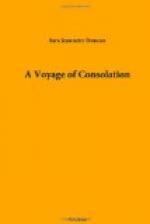“Mr. Bebbini,” said poppa, “if you go around contradicting Americans on the subject of Christopher Columbus your business will decrease. As a matter of fact, Christopher wasn’t born, he was made, and America made him. He has every right to claim to be considered an American, and it was a little careless of him not to have founded a family there. We make excuses for him—it’s quite true he had very little time at his disposal—but we feel it, the whole nation of us, to this day.”
The Via Balbi was cheerfully crooked and crowded, it had the modern note of the street car, and the mediaeval one of old women, arms akimbo, in the nooks and recesses, selling big black cherries and bursting figs. Even the old women though, as momma complained, wore postilion basques and bell skirts, certainly in an advanced stage of usefulness, but of unmistakable genesis—just what had been popular in Chicago a year or two before.
“Really, my love,” said momma, “I don’t know what we shall do for description in Genoa, the people seem to wear no clothes worth mentioning whatever.” We concluded that all the city’s characteristically Italian garments were in the wash; they depended in novel cut and colour from every window that did not belong to a bank or a university; and sometimes, when the side street was narrow and the houses high, the effect was quite imposing. Poppa asked Alessandro Bebbini whether they were expecting royalty or anything, or whether it was like this every washing day, and we gathered that there was nothing unusual about it. But poppa said I had better mention it so that people might be prepared. Personally, I rather liked the display, it gave such unexpected colour and incident to those high-shouldering, narrow by-ways we looked down into from the upper level of the Via Balbi, where only here and there the sun strove through, and all the rest was a rich toned mystery; but there may be others like momma, who prefer the clothes line of the Occident and the privacy of the back yard.
The two sides of the Via Poverina almost touched foreheads. “Yes,” said Alessandro Bebbini apologetically, “it is a ver’ tight street.”
Poppa was extremely pleased with the appearance of the house of Christopher Columbus, which Alessandro pointed out in the Via Assorotti. It was a comfortable looking edifice, with stone giants supporting the arch of the doorway, in every respect suitable as the residence of a retired navigator of distinction. Poppa said it was very gratifying to find that Cristoforo had been able, in his declining years, when he was our only European representative, to keep his end up with credit to America.
You so often found the former abodes of glorious names with a modern rental out of all proportion with their historic interest. This house, poppa calculated, would let to-day at a figure discreditable neither to Cristoforo himself, nor to the United States of America. Mr. Bebbini, unfortunately, could not tell him what that figure was.




